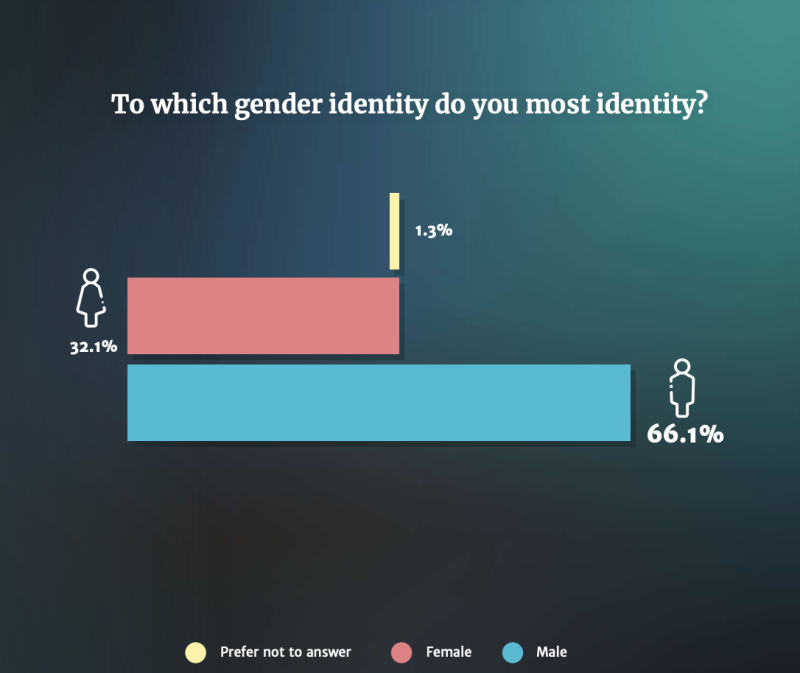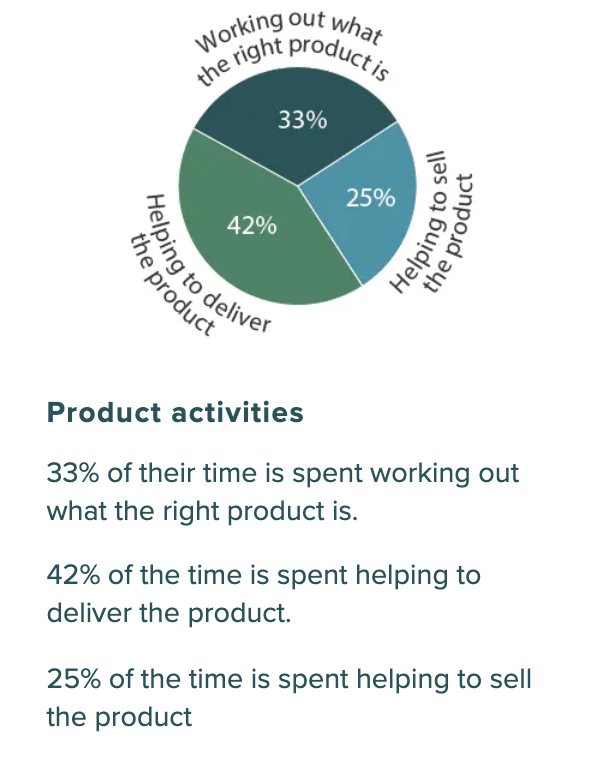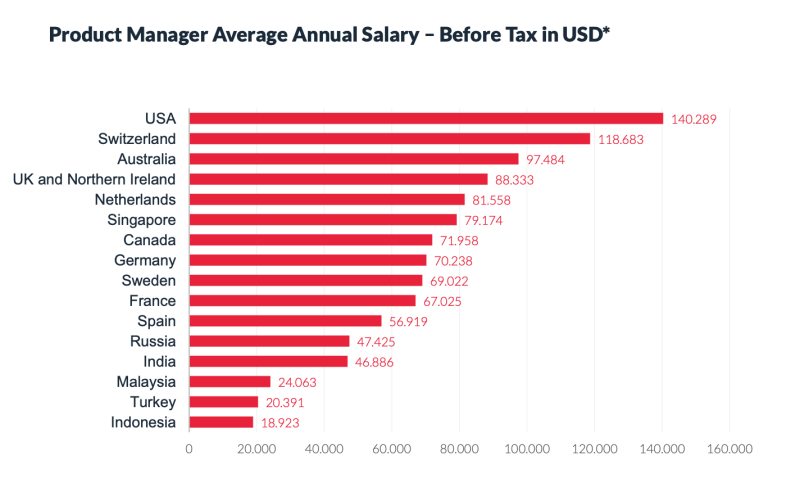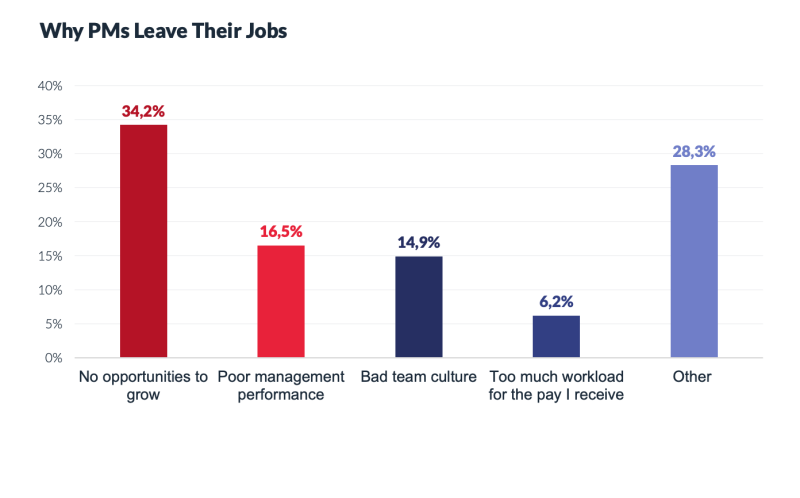The rise in the demand for product managers means that more and more people are considering a product manager career.
As of August 2020 Glassdoor has ranked a product management position as the 4th best job in the United States and the portal currently has 12,173 listings for it.
“The Future of Product Management Report” by Product School has the global average salary for a Product Manager $110,916/year which has encouraged more and more people to start looking into the product manager career.
So what do you need to know before diving in on the path to become a product manager?
Here are a few interesting stats to know before starting on your journey to becoming a Product Manager:
What kind of education do you need to become a product manager?
Product managers come from a variety of educational backgrounds and can have a degree in fields like marketing, engineering among others.
There isn’t any specific undergrad course you can take for the role.
However, product managers are very focused on continuous learning - many will have a product management certification.
There are many different classes, bootcamps, and trainings that are available for anyone that is interested in product management and wants to learn more about how to be an effective as a product manager.
We have more information on the best courses available for product managers in 2022.
The best product managers are the ones that do have a deep understanding of their industry.
As more and more companies are looking for product managers there may be an expectation that product managers understand the industry that their company is in, whether that be technology, insurance, or anything else.
Is there a gender gap in product management?
Product School’s report surveyed product managers in 263 cities in 85 countries and learned that 32.1% of the respondents are female, 66.1% are male and 1.8% did not wish to specify their gender.
So a fairly large gender gap is prevalent in the role as with many other roles in the tech sector.
The World Economic Forum states that female employment in tech overall ranges from 15% to 37%.
Many suggestions were made to level the playing field for women including equal maternity and paternity leave and higher emphasis on income equality.

Are product managers the “Jack of all Trades”?
Many companies will expect that their product managers will be able to test the product, create wireframes and track the performance of their product - what many companies fail to realize is that product managers rely heavily (as they should!) on their QA, UI/UX designer, and data analyst.
So what do product managers do? They build relationships with their customer, what the team should build next, and be able to prioritize requests from the customer.
What are the core capabilities that a product manager should have?
The McKinsey Product Management Index has listed down 5 core competencies that product managers should have:
Business acumen - they have to be comfortable with their business strategy, be able to prioritize for the team, have a go-to-market strategy, and understand pricing as well as tracking the key performance metrics
Customer experience grounding - have a great understanding of customer needs and be able to design customer-centric experiences
Market orientation - have a deep understanding of the market and its trends, their competitors and partners along with their strategies
Soft skills - be able to lead and rally the team and communicate effectively with the customer, the team, and external stakeholders
Technical skills - know technology trends, understand the tech stack and manage the development life cycle
Do Product Managers have to be technical?
The short answer for that is no, according to the study by the Product School mentioned earlier, currently only 30% of product managers having coding expertise. But there can be a lot of advantages to honing your technical skills.
Having a strong technical foundation means that you are more competitive as a candidate. Having technical skills means that while you are working with your team you’ll have the ability to assess how the team is planning on doing the work.
Your team will also be able to bring forward issues that they are having to you and they’ll take your opinions about the product more seriously since you’ll know what’s going on under the hood as well.
Being technical also means that you have the ability to build a more realistic roadmap since you know the challenges from a technical perspective as well as the product perspective. It’ll allow you to better understand who gets involved when and prioritize items for your team better.
What do product managers spend their time on?
A survey by Product Focus shows that product managers spend 33% of their time working on what the right product is, they have a solid understanding of what current market trends are, what their competitors are doing and what customers are looking for.
42% of their time is spent on helping to deliver the product, this means that they not only have to review what the team has built, but that they also need to ensure that it serves the purpose of what customers are looking for.
25% of their time is spent on working with the sales team to sell the product, product managers need to believe in the product that they are working on and rally the team behind them to win customers over. They also need to work closely with their sales team so that they can properly highlight the most impressive parts of their product and ensure that these key selling points are not missed with customers.

What does a product manager’s career path look like?
Many companies start off by hiring Junior or Associate Product Managers, the next step up from that would be Product Manager. According to PayScale, the most common path for Product Managers is to move into the Senior Product Management role and eventually into a role similar to Product Management Director.
While different companies have their own product manager career paths that seem to be the most common route.
Other roles that Product Managers can move to are in marketing - either into a Product Marketing Manager or Marketing Manager role and eventually the Marketing Director role.
In smaller companies that do not have as many tiers as larger companies, a lot of product managers usually report directly to a C-level executive since the impact that they would have on the company is substantial.
The 2021 Product Management Survey by Product Focus shows that currently, 42% of Product Managers report directly to the board.
The structure of a product team depends largely on the size of the company, budget as well as the company’s objectives.
What do product managers earn in a year?
The Product Management Festival report broke down what product managers earn in a year by country, with the USA coming at the top of the chart at 140,289 per year and Indonesia at the bottom of the list at 18,923 per year.
Switzerland and Australia are in second and third place respectively at 118,683 per year and 97,484 per year.
Canada surprisingly was seventh on the list at 71958 per year. The chart below from the report breaks down the average salary for the countries.

What company size do product managers want to work for?
According to the Future of Product Management Report, 55% of Product managers prefer to work for SMEs, which have more flexibility and a keener sense of experimentation.
45% prefer to work for bigger companies since they would have more resources made available to them as well as be provided with better compensation. They would be willing to deal with more bureaucracy and siloed thinking which is usually typical for larger companies as a trade-off for more resources and better pay.
The split between the two types of companies is not very large and usually comes down to personal preferences for product managers. It all depends on the kind of environment they thrive in!
Why do product managers leave their jobs?
A report by Product Management Festival cites the following reasons as why most people leave their product management jobs
The most common reason at 34.2% was that there were no more opportunities for them to grow, this can be prevalent in smaller companies or even large companies that don’t have much structure around their product organization.
The second most common response at 28.3% was “Other” which doesn’t provide much insight into why a product manager would leave their job.
Poor team management was picked as the third reason by 16.5% of product managers, with bad team culture coming in at 14.9%. Lack of proper management coupled with bad team culture can create a toxic environment for any product manager.
Product managers are responsible for rallying the team behind their vision and the above two situations can make their product management jobs extremely difficult.
The last reason picked by product managers coming in at 6.2% in the survey was that they had too much workload for the pay that they were receiving.
Many companies can expect their product managers to be wizards and may expect a lot from the role without thinking about if they are being properly compensated for everything that is on their plate.

Ready to get started?
Switching careers or moving into unchartered territory can be daunting but many professionals have successfully made the switch to product management and have thrived there!
This article can be a jumpstart into a product manager career that you can easily fall in love with. For more resources and a better understanding of the role check out our blog here!

Zayeema Sarwar

Read also


Experience the new way of doing product management

Experience the new way of doing product management






